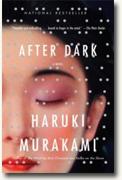After Dark
Haruki Murakami
book reviews:
· general fiction
· chick lit/romance
· sci-fi/fantasy
· graphic novels
· nonfiction
· audio books
· author interviews
· children's books @
curledupkids.com
· DVD reviews @
curledupdvd.com
newsletter
win books
buy online
links
home
for authors
& publishers
for reviewers

 |
After Dark Haruki Murakami Vintage Paperback 256 pages April 2008 |
|
Haruki Murakami has always written fairly straightforward, declarative sentences. In his latest novel to be published in English, the Japanese writer’s prose is distilled down to its essence. This is not a trick of translation, as the Japanese title of the novel reveals: Afutadaku
Murakami is anyway always interested in the sorts of connections that most people don’t see. “The gates between worlds” is perhaps his major theme, though a gate might be the bottom of a dry well (The Wind-up Bird Chronicle), the difference engine at work between the cerebral lobes of a character (Hard-boiled Wonderland and the End of the World), or a painting (Kafka on the Shore). Hardly gates at all, really; let’s say then that his theme is the alchemical and surrealist one of “communicating vessels.” Except that the vessels in After Dark Set in what amounts to no more than a few square kilometers of Tokyo, After Dark But—we wonder—who was that Man with No Face? What could he have done to Eri Asai? And where has he gone off to now?... What could possibly be happening? The contact point in the circuit connecting the two worlds is being shaken violently, threatening to obliterate the clear outlines of [Eri’s] existence. The meaning of her physical sense is eroding.And then our kino eye, our TV eye, shifts again with little revealed or changed. It’s not the scene that vanishes but we who turn away with little more than a shrug. Murakami’s pyrotechnic imagination is absent from this novel, making it more like one of his short stories (in one, for instance, a man spends his life cooking noodles). Instead, we get a kind of vampirish life of everyday things, and it’s between those things that contact between people is made. The Chinese prostitute, for instance, drops her cell phone when she’s attacked by the Japanese businessman. The phone ends up in a refrigerator case in a 7-11 and, when it rings, is answered by a total stranger who is threatened by an equally unknown stranger: we know where you are; never sleep, we’ll find you. Or in the Denny’s, where Mari and Takahashi connect over whether or not to order chicken in a restaurant. And the nighttime itself wraps everyone and everything in a blanket that threatens equally to smother as well as connect. This short, largely plotless novel is far from my favorite of Murakami’s books, but it does have its pleasures. It’s a meditative, lyrical piece of work that, however bleak, has its moments of humor. Mari, in a bar, listening to old jazz records, asks the bartender why vinyl instead of the more convenient CDs. “I don’t like CDs,” he says, “they’re too shiny,” to which a walk-in character asks, “Are you a crow?” Murakami’s language, spare as it is, hits high notes of poetry that momentarily lift us up out of this thick blanket of consuming night. And, too, there’s the weave of objects crossing paths with people that give the book an impetus that at once enchants and enthralls. And it’s set, after all, after dark, in a single night and now “the night has begun to open up at last.” This is the return of hope and enlightenment, perhaps, for which “there will be time until the next darkness arrives.” Originally published on Curled Up With A Good Book at www.curledup.com. © Brian Charles Clark, 2007 |
| Also by Haruki Murakami: |
|
|
|
 Click here to learn more about this month's sponsor! |
|
| fiction · sf/f · comic books · nonfiction · audio newsletter · free book contest · buy books online review index · links · · authors & publishers reviewers |
|
| site by ELBO Computing Resources, Inc. | |
 Indeed, Murakami is, as usual in his stories and novels, after some sort of universal experience. It’s just that this time the connections between people are thin, barely visible, worn down, it would seem, by years of abuse.
Indeed, Murakami is, as usual in his stories and novels, after some sort of universal experience. It’s just that this time the connections between people are thin, barely visible, worn down, it would seem, by years of abuse.